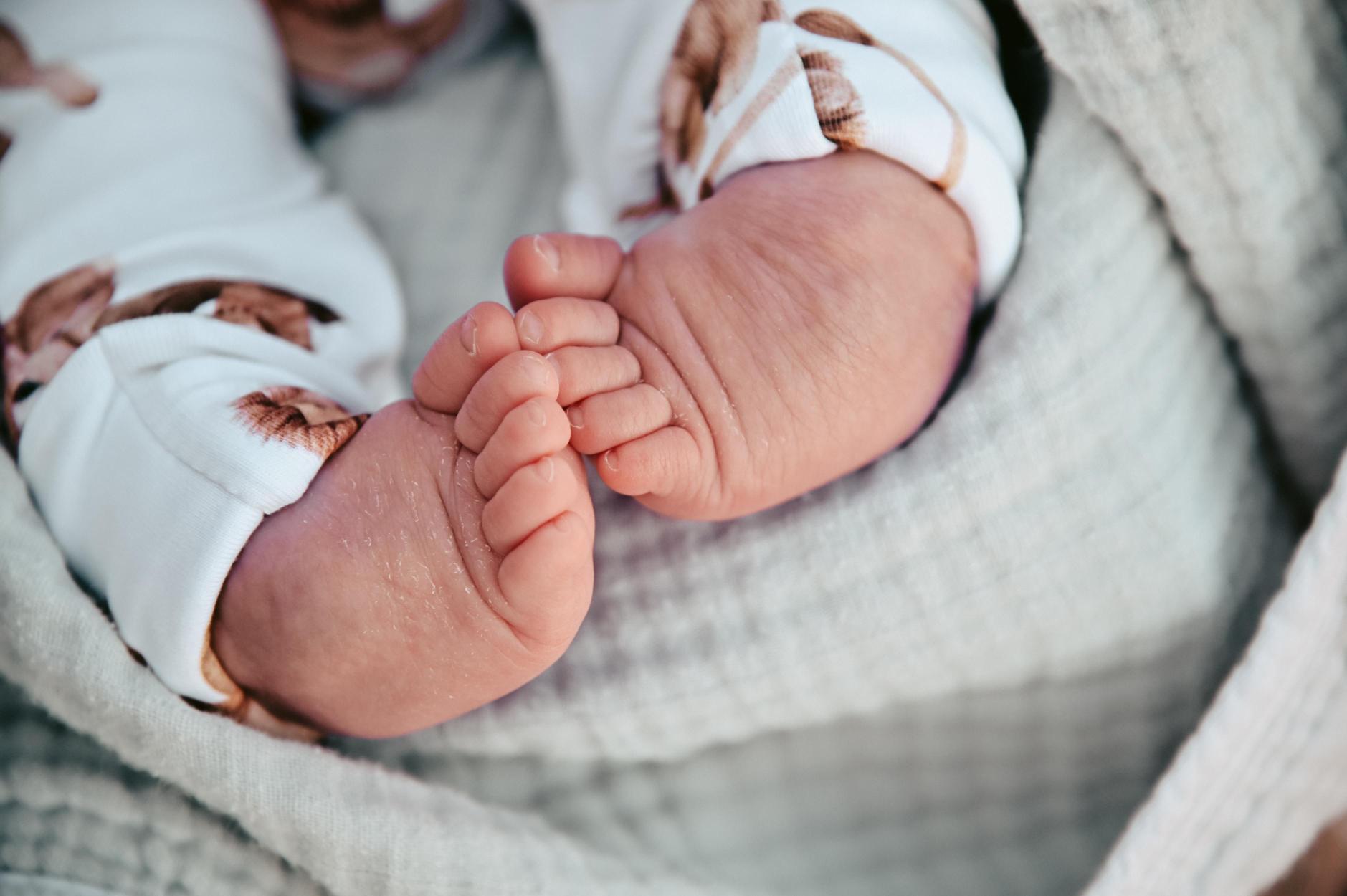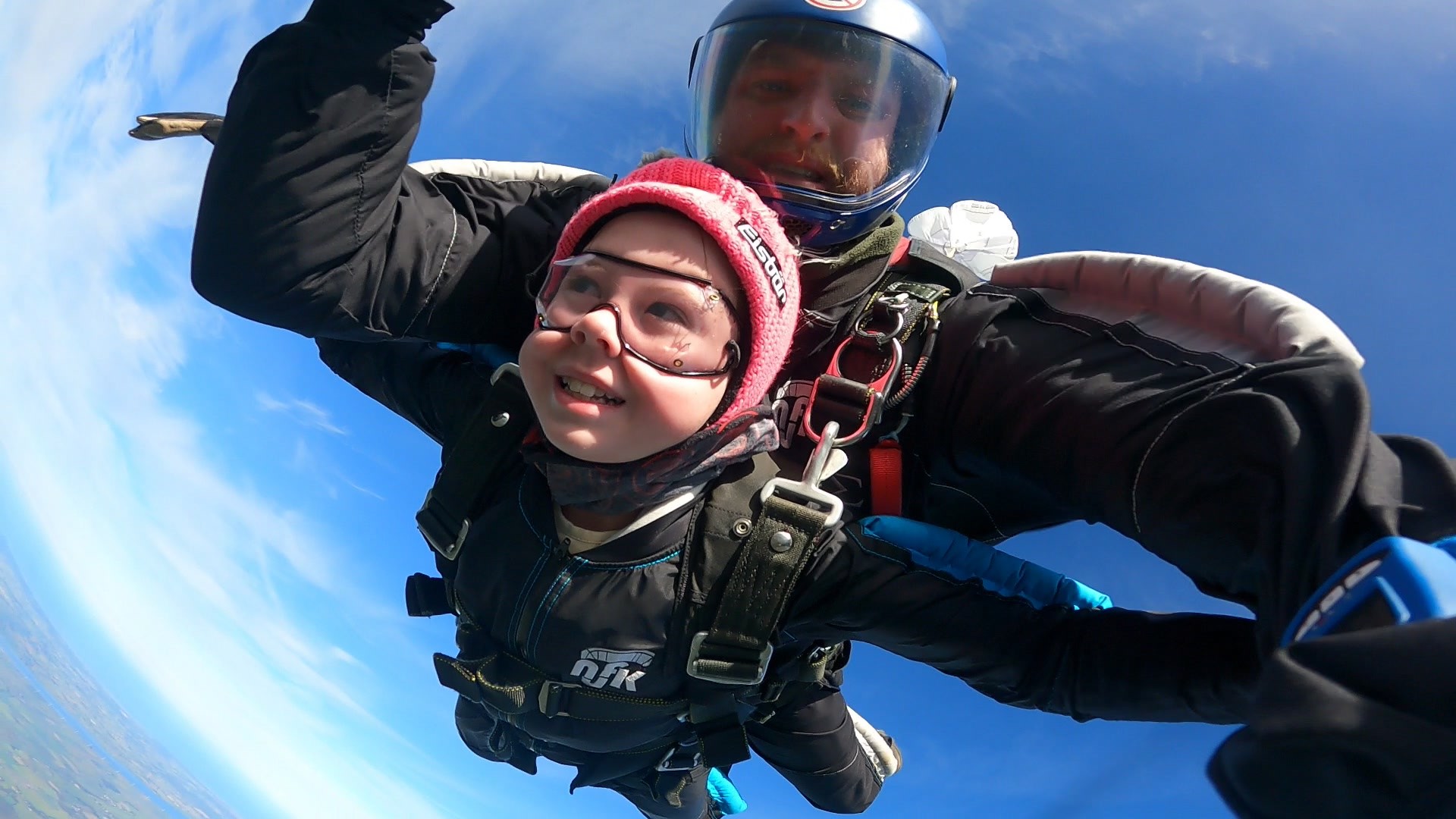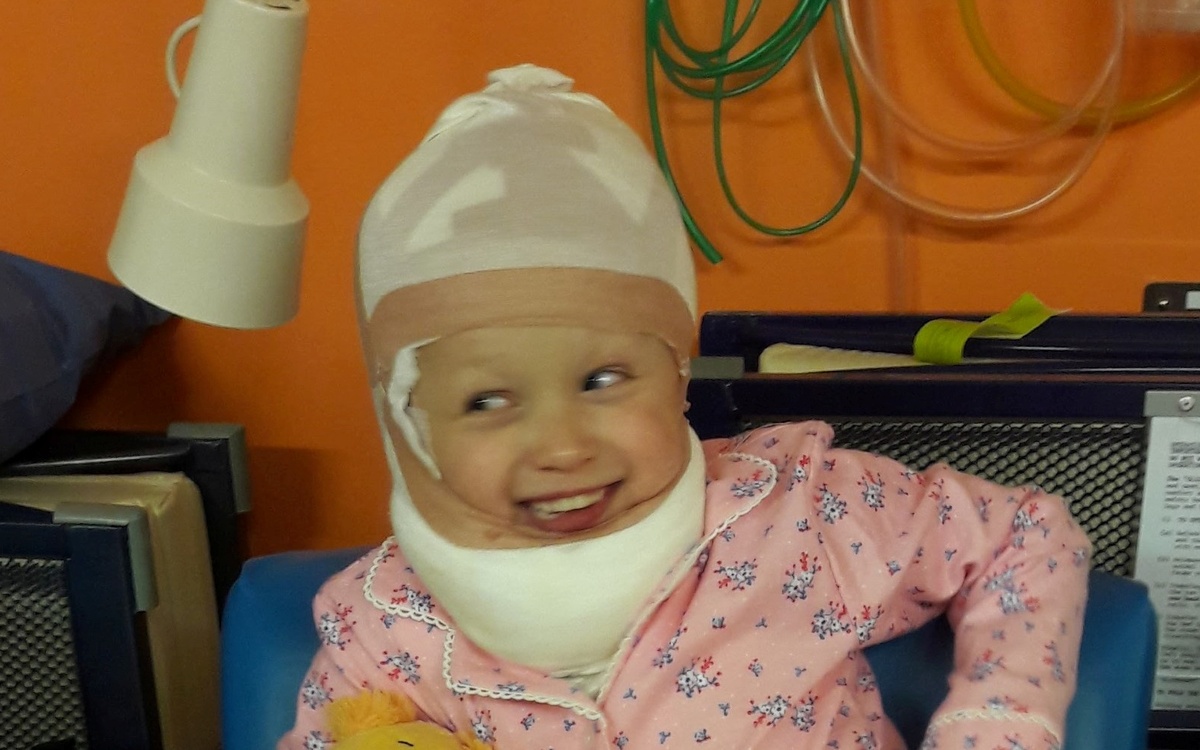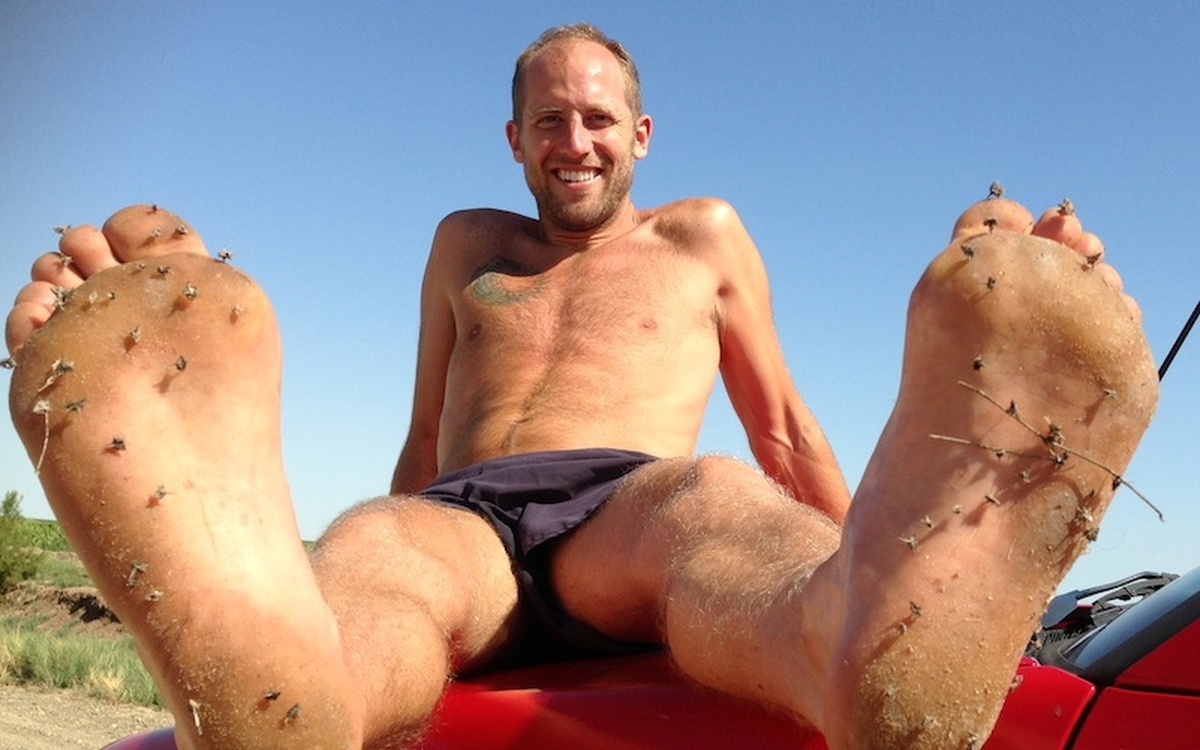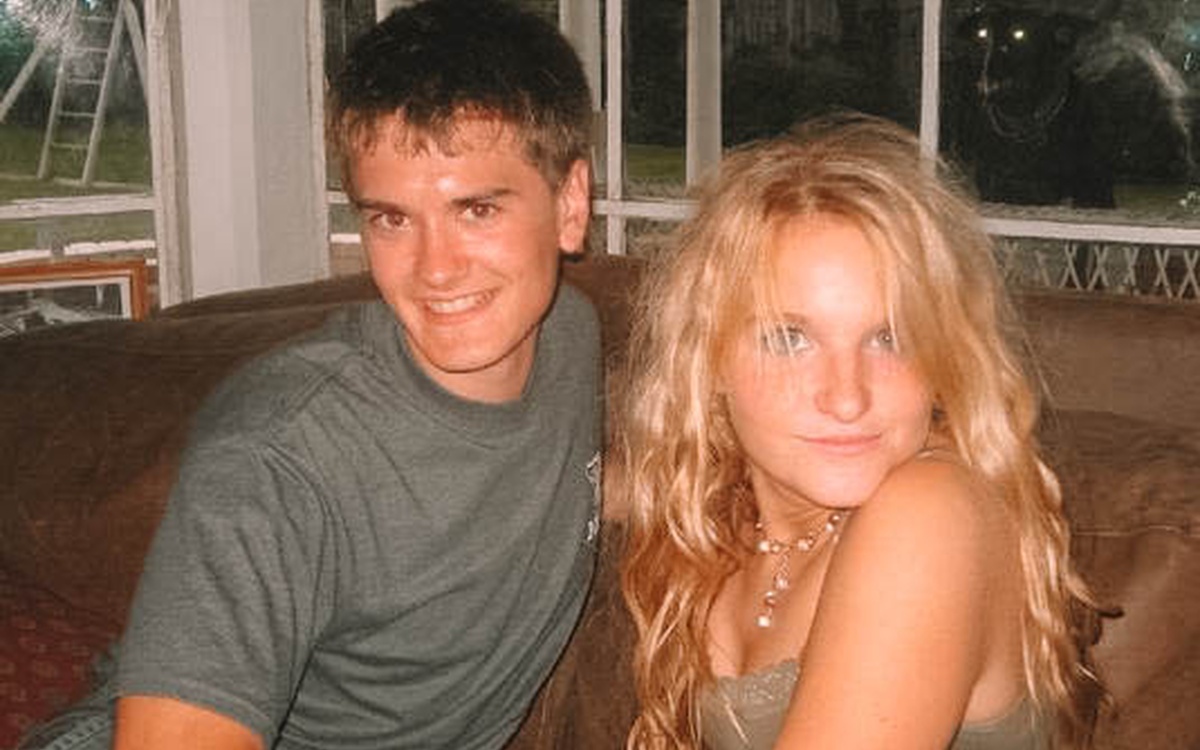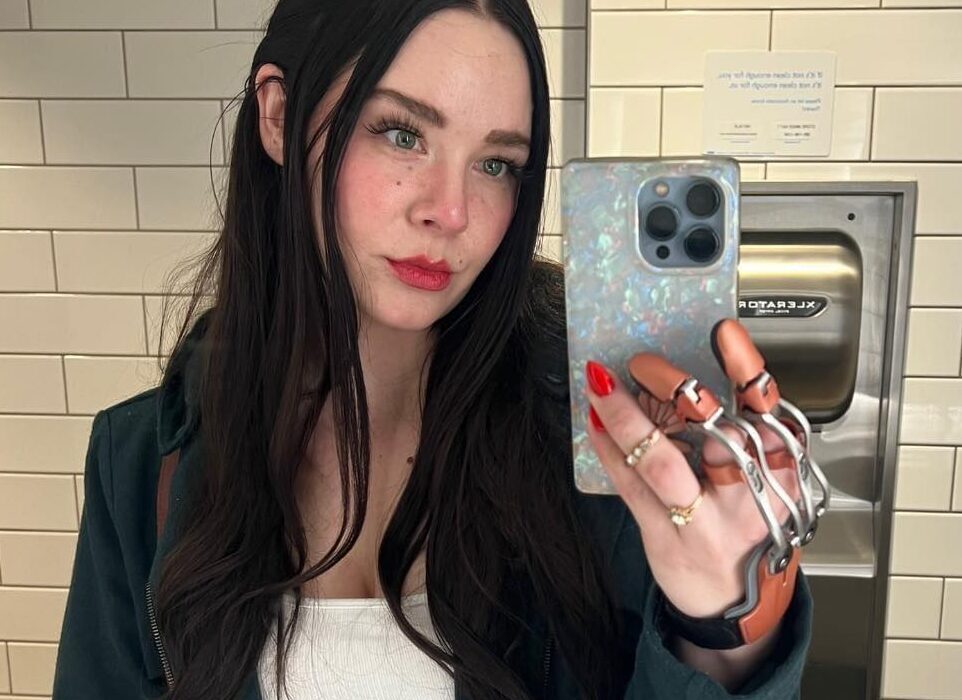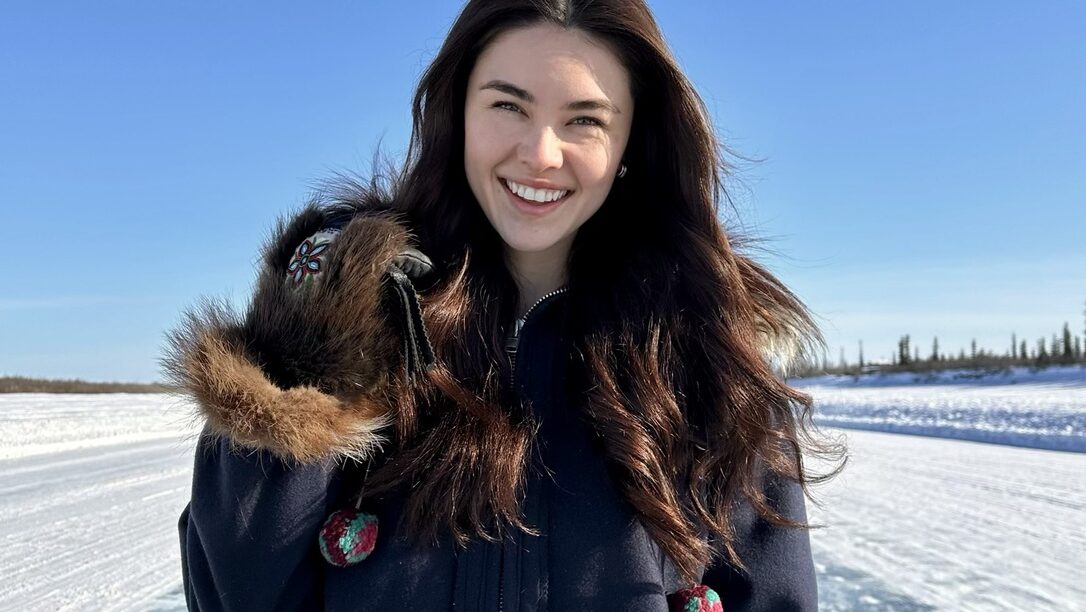Baby spends half his life in casts after being born with inturned feet
A baby has spent half of his life in leg casts after he was born with his feet - turned inward.
Baby Malakai Kade Sanders, four months, has spent the first eight weeks of his life in casts to straighten out his little legs.
Parents Kayla McHugh and Trai Jayden Sanders, both 27, found out their son had club foot, also known as Talipes, at 20 weeks pregnant.
Club foot is a deformity in which an infant's foot or feet are turned inward.
Mum Kayla said her "heart sank" when doctors revealed the diagnosis.
She said: "It was extremely frightening, confusing and difficult to go through.
"Our biggest concerns and worries were what Malakai’s future was going to look like.
"Will he be able to walk? Will he be able to run one day?"
Since he was born, Malakai has had surgery on his feet and ankles, spent eight weeks in casts and will now have to wear special boots to help re-position his legs.
There's still a long road ahead for Malakai but parents Kayla and Trai are hopeful and say Malakai's future "actually looks really great."
Kayla, an early life educator from Sydney, New South Wales, Australia found out about the irregularity during an ultrasound scan 20 weeks into her pregnancy.
The parents, who already have two children Jye, six, and Nixon, two, "knew something might not be quite right" when the technician changed the conversation during the scan.
The diagnose wasn't immediately revealed to the parents and doctors had to run additional tests to confirm the condition
After a tense four-week wait for the results, the diagnosis was confirmed.
Kayla said she was "devastated, alone and so scared."
She added: "We had never dealt with anything like this before so it was a very new unknown territory for us.
"We wondered if he’d get picked on for his condition and if it would cause him any serious grief as he got older."
As soon as the diagnosis was confirmed, Kayla and Trai learnt everything they could about the condition and met up with a physiotherapist.
So when Malakai was born they were ready to face the challenge.
As soon as the young boy was born, he underwent six weeks of casting to re-position his little legs.
He then went on to have a procedure called a tenotomy followed with further casting.
A tenotomy is a procedure where an injured tendon is cut into to relieve pressure.
In Malakai's case this was on his feet and ankles.
Once his tendons had healed and his final casts had been removed, Malakai was then put into a special pair of boots for 23 hours a day.
The Ponsetti boots are specially adapted with a bar to re-position the legs of the affected person.
Malakai will have to wear the boots until he is five years old and gradually reduce the hours he wears them a day.
Despite all the heartache and stress for Malakai and his parents, they say his future looks good and they're looking forward to it as a family.
Kayla said: "Malakai’s future actually looks really great.
"Malakai may still need to undergo more procedures to his feet such as another Tenotomy or a tendon transfer however he may not have to.
"Every child is different and may need things others don’t. Only time will tell."
"We still worry about the possibility of Malakai relapsing and having to go through casting, further surgeries and the boots and the bar into his teen/adult years."
Boy, 11, with fear of heights sets new record with 10,000ft skydive
An 11-year-old has set a new record for a youngest 10,000ft skydive - taking the title from his own aunt.
Tyler Love became the youngest person from Scotland ever to complete a 10k feet tandem dive - despite being afraid of heights.
And he took the record from his aunt Tammi, now 29, which she has held for the last 15 years - having done her jump when she was 14.
Tyler, from Bo’ness, has now become the youngest person from Scotland to do a 10,000ft tandem parachute jump.
Skydiving runs in the family - his mum Kerri Anderson is also a keen skydiver and a qualified solo jumper.
Tyler’s grandad Tom Anderson is set to make his 1000th jump this weekend and gran Lynn has also done a tandem skydive.
Tyler begged Kerri to be allowed to make the leap so she booked a surprise trip to Denmark, where kids under 16 are allowed to tandem skydive.
They were accompanied by Kerri’s partner Nathan Pope, another qualified skydiver, and his daughter Grace, twelve, who also took the plunge.
Tyler and Grace also raised over £1,200 for charity with the leap.
Kerri said: “My partner and I both skydive, and the kids watch us skydive most weekends.
“They’d been talking for a while about wanting to do it themselves.
“In the UK, you have to be 16 to skydive in any form. We did some research and found out that in Denmark, it’s a bit different.
“We found a drop zone in Denmark, booked it, and then told the kids – they were really excited!
“After we’d booked it, Tyler mentioned that he’d like to do it for charity and raise some money.
“People were really eager donate, and were writing well-wishes, so we went through all the messages with Tyler and Grace.”
Despite the excitement, 11-year-old Tyler was still scared of heights – and the family were nervous that he wouldn’t make the jump at all.
However, once they took to the air, Tyler pushed past his fear and completed the jump – phoning his Aunty Tammi, 29, when he hit the ground to let her know he’d claimed the title.
“My sister did a tandem skydive when she was 14 – she was the youngest in Scotland until Tyler did his,” said Kerri.
“Everybody’s been buzzing – we didn’t know if he was going to jump. Tyler has always been scared of heights, so everybody was impressed that he’d jumped.
“The first thing Tyler did when he landed was phone his Aunty Tammi and say, ‘I’ve beaten your record!'
“I think that beating the record was what pushed him to do it.
"I’m very pleased – I don’t know if my sister is though!”
Tyler and Grace’s jump raised over £1,200, which the family will split between local food banks and children’s charities.
“The kids were originally aiming for £200 – we’re now over £1,200 and we can’t believe it,” said Kerri.
“Tyler’s done me, the family, and most of all, himself proud.
“He’s overcome a fear and I’m really proud that he went ahead with it – and that he wanted to do it for charity.
“Now the kids know that they’ve got that in them, and I’m really proud of them – they’re amazing people.”
Brave girl badly burned by firework warns other kids of the dangers
A brave ten-year-old girl who needed a skin graft after she was hit by a firework is warning other kids of the dangers of Bonfire Night.
Rosie May, 10, went to a Bonfire Night celebration where she was hit by a stray firework which left her with severe burns.
She was rushed to A&E and kept in hospital for over a month but has suffered a permanent neck injury.
This week she went into her local school to give a talk on fire and firework safety.
Her mum, Eleanor Mason, 34, said: "We were terrified when she was hit, and didn't know what would happen to her, but seeing her overcome it makes me so proud of her."
Eleanor Mason took Rosie and her son Christian, 12, over to a friend's house in Cwmbran, South Wales, to celebrate Bonfire Night in 2017.
Eleanor said: “We went over for a get-together to see some fireworks.
"Everything was being done safely and responsibly, we had a bucket of water on hand, sand, and were all a safe distance apart.
“But then a multi-shoot firebox was lit and one didn’t shoot straight, it went off at an angle and shot off in Rosie’s direction.”
The firework hit Rosie, May who was only four at the time, in the front of her neck.
“I rushed over terrified to see if she was ok.
“She had a scarf and hood on which caught fire, I was panicking.
“We patted her down, got her inside the house and stripped her out her clothes immediately.
Eleanor phoned 999 where she was told by paramedics to put Rosie in a cold bath immediately and douse her in the water.
Paramedics told us to put her in bath, douse her in water
“Once they got to the house she was rushed to A&E at Royal Gwent hospital in Newport,” Eleanor said.
“It was horrible, it looked like a scene from Casualty.”
Rosie was blue-lighted to Morriston hospital in Swansea on the same evening for burns treatment, arriving at around 10pm.
Eleanor, a support worker, said: “I knew from my first aid training that if someone is screaming, the chances are they ok, but Rosie was silent, she just wanted to hold me
“I was in total shock, it was a big scary thing for a little girl.”
Rosie was kept in hospital for five weeks, where she had to be put under anaesthetic and have her neck wound meticulously cleaned.
Surgeons then performed a skin graft on her, using skin from her scalp due to its similar pigmentation.
She came out of hospital with full head and neck bandages.
Once she was back home, Eleanor and husband James had to clean her wound and redress it for months on end in the bath.
Eleanor said: “It was quite traumatic for her, even a year after she was reluctant to get into bath without being bribed!”
"We were regularly back and forth for hospital checkups, even now we still have check-ups, once every couple of years.
Thankfully, the damage to Rosie was purely cosmetic, but her mum says it has also taken a toll on her mentally.
Eleanoor said: “She’s been so good about it, she’s so resilient.
“She’s also had counselling, just to give her the tools that she needs to fully put it behind her.
“We now go bowling on bonfire night instead.”
Both mum and daughter are now ambassadors for the Children’s Burns Trust, while Rosie even goes into schools to talk about fire and firework safety.
Eleanor said: “She has turned a negative into a positive thing to help others who have been through similar things, we are so proud of her.”
Deputy Chief Fire Officer Chris Bigland of Bedfordshire Fire and Rescue Service gave his top tips for enjoying bonfire night safely.
- The safest way to enjoy bonfire night is to go to an organised event
- Alcohol and fireworks don’t mix
- Have exclusion zones around bonfires
- Have someone there who is solely focussed on safety
- Make sure you have a bucket of water nearby any big fire
- Don’t let a fire get too large
- If you are setting off fireworks, ensure you follow the correct procedure as outlined on the packaging
Bonfire Night - or Guy Fawkes night - is traditionally held on November 5.
"I have been barefoot for over a decade"
Meet the man who doesn't own a pair of shoes after going barefoot for more than a decade - even when walking around mountains.
Robin Greenfield, 37, was inspired to ditch his trainers in 2008 when he joined a university trip travelling across New Zealand and noticed one of his course leaders walking around barefoot.
Robin was "intrigued" and started walking barefoot with him - which he said was a "natural draw and felt amazing".
From 2011, Robin went barefoot full-time and started strolling around the supermarket, the high street and even mountains without any footwear.
Robin often has to bandage up his own feet due to standing on glass but that hasn't put him off.
Robin said he spends most of his year barefooted but will put on a pair of shoes when he needs to - if it is snowing or a low temperature.
He also carries a pair of shoes around with him in case he goes somewhere that requires footwear but will often avoid those places as he prefers to be barefooted.
Robin said his feet don't hurt often but he can sometimes get thorns or glass stuck in his foot and said the worst surface to walk on are allies in the city.
Now, Robin is using his experience going barefoot to teach others how to embrace his unconventional lifestyle.
Robin, an environmental activist, from Asheville, North Carolina, US, said: "I started walking barefoot and I loved it.
"It felt excellent - it was a very natural draw.
"I don't recall a time having a particular reason except that it felt right. I wanted to go barefoot, and I did it.
"By being barefoot in public spaces, I am often the only one.
"I went to a festival last weekend where there were 5,000 people.
"I didn't see a single other person that was barefoot, and I had hundreds of people looking at my feet."
Robin owned just one pair of shoes for three years but got rid of his last pair six months ago and has yet to replace them.
Often he will decide to go with a pair of socks for comfort and warmth.
Robin said he often faces strange looks from people but said he would never go back to wearing shoes.
He said: "It took me years to overcome social norms or stigma - still today I receive some.
"A few years ago, I was walking barefoot in downtown Glendale, California.
"It is a very fancy area, and I could see people in their thousand-dollar clothes looking at me like I was nothing.
"People look down on me a lot, people often assume I am homeless. Their perception is I am down and out, and I have no other choices.
"But the benefit of that is it keeps me humble, I got rid of my last business clothes around eight years ago because I don't to impress people with my clothes.
"I start at the bottom for a lot of people, and I like that.
"I want to be humble, and it is a practice of humility to be barefoot."
Robin said his family were "understanding," but some relatives were "concerned" about what he was doing.
He said: "They were concerned about my future and if I was making choices that were going to create success and such.
"But also, supportive?. The Greenfield's - we're a small family and we're all weirdos in one way or another.
"We're all unique, none of us fit into the societal norms and so I got a lot of support.
"My mum and dad - I am the thing they are most proud of in their whole entire life."
Robin says he loves people look at him strangely and ask him questions about why he is barefoot - as it allows him to educate people on why he is doing it.
He said: "For me, being barefoot is an opportunity to reach people at any moment, with every step that I take to break outside societal norm.
"Normal is destroying normality and by continuing the status quo we are leading to the demise of humanity.
"Everywhere I go, I am creating opportunities to shake people up, to stir people up.
"I love for people to ask me why I am barefoot. I love for people to look at me as it gives me the opportunity to reach people."
Robin has now launched Barefoot School where he teaches people why and how to be barefoot and learn how to love their feet.
The first session took place in Asheville, North Carolina, US, in July 2023 with around 40 attendees.
Robin said: "It was a weekend of reconnecting with the earth through being barefoot as well as foraging, spending time in the woods and connecting with communities.
"Being barefoot was the centre of the school but it was a gateway of reconnecting which is a big part of being barefoot."
TOP TIPS FOR GOING BAREFOOT
- Start on easier terrain
- Work up to some more challenging terrain
- Don’t push yourself beyond your limits
- Know that some cuts and scratches are ok
- Break free from societal norms
- Design your life around being barefoot
Puppy braves the wind during storm Babet
This is the cute moment a puppy braved the high winds of Storm Babet.
Cocker spaniel Mylo, one, stood strong as the gusts blew on Balmedie beach, north of Aberdeen.
Owner Euan Duff, a camera operator, videoed the dog during a walk on Thursday (19/10).
He said he went out despite the bad weather as Mylo and his other cocker spaniel Poppy, four, would have gone "crazy".
The 34-year-old, from Blackburn, Aberdeenshire, said: "The girls are two working spaniels.
"They are very good with the weather. If you don't take them out they go crazy.
"It was rainy and windy but we were on the sand dunes where we were well protected.
"Where we live we were lucky that we were sheltered from the winds and flooding.
"We have been very lucky but we know people who haven't been so lucky."
"We’re child-free so we can prioritise experiences"
A couple are child-free so they can prioritise experiences over everything - and say they don’t want to "miss out" on adventures by having kids.
Helene Sula, 36, and her husband, Michael, 36, are intentionally child-free and consider themselves as DINKS - which stands for 'dual income no kids'.
The couple grew up Catholic in Dallas, Texas, US, and after getting married had considered children as the next step.
But they realised they didn’t want to "miss out" on experiences after going to Tomorrowland festival.
Helene and Michael, who run a travel blog together, didn’t have a "calling" for children and said it didn’t feel "right" to have them for the sake of it.
Instead their child-free lifestyle has enabled them to live in Germany, the US, and the UK and visit 56 countries and counting.
Helene, a travel blogger, currently living in Oxford, said: “We're in an incredible time where we can do what we want in life.
“We’re living the dream.
"We prioritise experiences over everything else."
Helene and Michael met in high school and got married aged 24 in 2011 and had always thought having kids would be the next step.
But after going to Tomorrowland festival in July 2012, they realised they didn’t necessarily see children in their future.
Helene said: “We thought ‘there is so much more that we’re missing out on'.”
Helene started a travel blog and grew it after a climbing injury stopped her from working her job in marketing and PR.
The couple decided to move to Germany in 2016 – and travelled around Europe.
Helene said: “We were missing out on kids but there is so much to explore.
“There is no wrong or right way.
“I had thought I wanted to have kids at a younger age but reset my framework and realised that’s not for me.”
The couple love the “spontaneity” they have to go on dates nights or go away last minute.
Michael said: “We met up with our friends in Croatia with a four-month-old and they hadn’t been on a date night in a year.
“I feel raising children is one of the most important things you can do in life.
“It’s such a selfless thing to do.
“You have to be certain you want one.
“I never felt strongly that way.
“I don’t feel a calling to be a parent and it didn’t feel right to do it as it’s the ‘done thing’.”
Helena and Michael moved back to Dallas, Texas, in 2019 and travelled around the US but moved to Oxford, in the UK, in October 2023.
They are able to work online while they travel and have visited 56 countries including Iceland, Croatia and Morocco.
Helene said: “I want to experience as many places as I can.
“It’s never ending.”
Helene's favourite places to visit have been New England, and the Christmas markets in Germany and France.
The couple said their family have been supportive but strangers are constantly asking when they are having kids.
For now it is something Helene and Michael don't see in their future but they haven't completely ruled it out.
Michael said: “Some people say not having kids is selfish.
“We’re more comfortable with the idea of not having children than we have been.
“The life we're living for me is so much more rewarding.”
"I lost my fingers in freak accident - now I'm being harassed by fetish community"
A mum who lost two fingers in a freak accident says she is now being "harassed" online by a fetish community.
Natasha Baggett, 31, claims she receives regular messages online from people who "cut off their own fingers" and "get sexual kicks" from her disability.
She lost two fingers in a woodwork accident in May 2019, and says she has faced harassment online since.
After losing her middle and index fingers and the top of her thumb on her right hand, Natasha quickly adapted to life with just eight digits and was even given a robotic hand through her insurance.
Mum-of-five Natasha, from South Seattle, Washington State, US, said: ''It seems such a small thing to lose fingers compared to other limbs, but you need your fingers for everything.
''I thought not having my fingers would be the hardest part, but it's actually dealing with these crazy people online.
''I was sickened to find out they also get a sexual kick from it.
‘'The images on their profiles are extremely disturbing once you realise that they have chopped off their own fingers.''
Natasha lost her fingers while making a laptop table for a high school student with a brain tumour - whose mum she connected with on Facebook.
Despite not being a professional carpenter she took the hobby seriously - juggling multiple projects at a time.
But while levelling out a plank of wood for the table, the saw she was using kicked back and flipped the plank into the air.
When the plank came back down, it knocked Natasha's fingers into the blade.
In the aftermath of the accident, while waiting for the ambulance, Natasha located one of her fingers in a pile of sawdust.
She was taken to Harborview Hospital, Seattle, where medics were forced to amputate due to the damage to her knuckles.
Despite her life-changing injuries, once Natasha was discharged from hospital, she still completed the table for the young boy with the brain tumour.
Natasha - who is married to Phil Baggett, 39, an airline pilot - said: ''I hated the idea of coming back to a messy house after the hospital so I did a bit of cleaning before the ambulance arrived.
''I'm a mum-of-five so it takes a lot to phase me.''
After adapting to her disability, Natasha was fitted with a robotic hand from Naked Prosthetics - which has proved useful when changing nappies, cooking and working.
She said: ''I started posting on Instagram about my injury because I wanted to help other people who were going through the same.
''And then all the weird messages just came flooding in.
''I was getting at least one message every week before I started reporting and blocking them.
''At first I thought I was getting supportive messages from other amputees as they were asking details of my accident.
''But then I realised the people I was talking to had cut their own digits off for the thrill of it.''
She has since learnt that this community who fetishise amputees call themselves ''hobby surgeons'' and often cut their own fingers and toes off ''knuckle by knuckle''.
During the four years since the accident, Natasha has been sent some ''really weird requests'' - including people asking for pictures of her nubs and making inappropriate sexualised comments about her hands.
Although she ''hates'' the negative attention from them, the plucky mum has also used social media to connect with other amputees in support groups.
Natasha - who is mum to, Payton, 14, Natalie, 12, Charlotte, seven, Genevieve, five, and Lucciana, three - said: “The support groups have been vital to my recovery, they have made me realise that I’m not alone and life goes on.
''But unfortunately some these hobby surgeons have infiltrated our support groups, totally invading our safe space, in order to find more amputees to harass.
''They have even taken screenshots mine and other women’s pictures and made Instagram accounts with all our images.
''It is absolutely terrifying that there are such sick and twisted people out there, and they are harassing people with disabilities.
''They are not ashamed at all, they even post publicly about it and ask each other for advice on how to handle the pain after severing their own fingers.'
''Sadly blocking them doesn't work as they just make new accounts, it's an impossible situation.
''It's very sad because there are many vulnerable amputees out there who are being exploited on social media and accept money for their requests.
‘'These people need to stopped but I don't know how, it seems these twisted people will always find a way.''
Dog throws tantrum to watch Bluey on iPad
A pet dog threw a tantrum to get his owner to play his favourite TV show on the iPad.
Chelsea Lim, 24, was watching a Korean drama on her iPad when pet dog Moji attacked the screen to get her to play Bluey.
A video shows Moji, a Shiatzu, scratching the screen of the iPad until Chelsea changes the program to the popular Aussie animated series.
Chelsea, a marketing employee in Manila, Philippines, said: "My dog knew that the iPad I was using is also the he uses to watch Bluey.
"When he saw I was watching a Korean drame, he started scratching his paws digging on my iPad.
"That's the tantrums he throws when he wants to watch Bluey."
Chelsea explained that watching Bluey in the evening is now part of Moji's bed time routine.
The three-year-old Shiatzu usually watches one episode before he goes to bed and has been doing so for about a month.
Chelsea said: "It all started when I was browsing for a show on Netflix and he saw images of the dog from Marley & Me.
"I was shocked that he could actually understand what was on the TV what's on the TV so I decided to look for a show that he might like and that was Bluey."
"I caught a flesh-eating parasite from mains water - now I'm blind in one eye"
A woman says she was left blind in one eye after contracting a flesh-eating parasite - from the tap or swimming pool.
Shereen-Fay Griffin, 38, lost sight in her left eye just under a year ago.
She believes she contracted the infection - acanthamoeba keratitis - two days after she had a swim at a local pool.
The infection is caused by a microscopic organism called Acanthamoeba, which is common in nature and is usually found in bodies of water.
At first, Shereen's symptoms were innocuous - itchiness, soreness and fatigue.
She consulted a GP who referred her to an optician who then referred her to an ophthalmologist.
Shereen was treated with steroids and told she would receive a call to set up a follow-up appointment
But as the weeks went on, the pain worsened and Shereen never received a call.
Almost ten weeks after her initial appointment, on November 9, she woke up blind in her left eye.
Shereen, who's from Crayford in Kent, went swimming at a local leisure center on August 19 last year.
Two days later, her left eye started to become itchy and sore.
Shereen, a Learning Support Assistant at a local secondary school, said: "My eye was sore, itchy and scratchy.
"My eyelid was heavy and I was feeling fatigued.
"I had been swimming. I used the swimming pool and shower there.
"I had also washed my face at home in the morning and night."
After trying over-the-counter treatment, Shereen went to her GP who prescribed her a week's antibiotics, which did nothing.
Her GP advised her to visit an optician, who gave her an urgent referral to Queen Mary's Hospital in Sidcup on September 1st.
There she was diagnosed with herpes simplex eye infection and given steroids and antibacterial eye drops.
But instead of improving, her symptoms continued to worsen.
Shereen said: "I’ve never in my life even had a cold sore so it was odd to me.
"The ophthalmologist sent me off with antibiotic eye drops and steroids even though I told him oral antibiotics hadn’t worked.
"I had a continuous dull pain in my eye. It didn’t seem right but was manageable with day-to-day life."
Shereen was told she would receive a call for a follow-up appointment within the week, but she says this never happened.
The following weeks Shereen says she called the hospital multiple times and even walked in herself, but received no follow-up.
She said: "I’d had no follow-up appointment. My eye was still in pain and my eye meds were running out.
"I rang the hospital a number of times for a few weeks before walking in there myself to find out what was going on."
She was given additional meds and sent home.
On November 9, Shereen woke up "in the most excruciating pain" and blind in one eye.
She said: "It was coming up to 10 weeks of no follow-up appointment and steroids four times day when I woke up in the most excruciating pain and completely blind in that eye!"
Shereen went to the hospital immediately and another doctor was able to diagnose her with acanthamoeba keratitis.
She was treated there but it was already too late.
All this time, Shereen's cornea was being eaten away by the parasite and the scarring left her blind.
Acanthamoeba keratitis is caused by a single-celled organism that enters the eye and eats through the cornea.
Following her ordeal, Shereen decided to go to the Wellington Hospital, a private facility in St John's Wood, London.
There a doctor told Shereen that the steroids prescribed had made things worse.
She explained: "I couldn’t trust the NHS doctors after this level of neglect.
"They had wrongly diagnosed and wrongly medicated me for 10 weeks with no follow-up appointments even though I had been chasing them.
"The parasite was in fact strengthened by the steroids I had been put on for 10 weeks hence why I ended up waking up blind.
"It was explained to me by the doctors that this rare infection was very resistant [to treatment.
"They said because mine had been strengthened with steroids for 10 weeks it was now super resistant."
Unfortunately, to this day, Shereen still lives in pain and has not recovered her vision.
Her only chance at recovery lies with a corneal transplant, which may not work, and would need to be repeated.
She said: "I was bed-bound for three weeks and was house-bound for four months. I was off work for a total of five months.
"I have no left vision which stops me from taking part in activities like football with my students.
"I have dull ache, dryness, itches, soreness and still some light sensitivity as my pupil struggles to dilate because of the scares on the front of my eye.
"[I will regain my sight] only if I agree to a cornea transplant which may not work."
Moorfields Eye Hospital said: "The infection is caused by a microscopic organism called Acanthamoeba, which is common in nature and is usually found in bodies of water as well as domestic tap water, swimming pools, hot tubs, soil and air.
"Acanthamoeba do not generally cause harm to humans, but they can cause a serious eye disease if they infect the cornea."
"I’m an Inuk living in the Arctic"
Meet the Inuk who grew up in the Artic eating raw beluga whale meat and lived so remotely she had to travel 15 hours for a Starbucks coffee.
Willow Allen, 24, grew up living in the town of Inuvik, in the Northwest territories of Canada, and lived off the land to survive.
Willow and her family hunt different animals during the seasons to eat – in the spring they hunt geese and caribou, a type of reindeer, and beluga whales in August.
They have 33 days of no sun in the winter – with temperatures dropping to as cold as -40C – and wear traditional mukluks, boots made from seal skin or moose leg and caribou, to keep warm.
In the winter they get around on snowmobiles and by boat in the summer.
Willow’s town has a population of 3,500 people and has two grocery stores with essentials – but is 15 hours away from the closest Starbucks and McDonalds.
Willow, a model and social media influencer, now studying social work in Saskatchewan, Canada, said: “In the winter there, since we are so far up north, we don’t see the sun for 33 days.
“We go up to the coast and hunt beluga whales.
“We eat the skin or fat.
“You can eat it raw, frozen or boiled.
“It has a very strong taste.
“When dried it is like beef jerky in texture.
“It’s not like anything else I have eaten.
“It’s always been a part of Inuvialuit culture. We never take more than we need.”
Only Inuvialuit are allowed to buy and sell beluga whale and Willow has to get a special licence to transport the meat down South.
She said: “People prefer hunting.
“We typically hunt different animals.
“We hunt geese in spring - and freeze it.
“In August, we hunt caribou when they migrate from Alaska.
“We eat caribou soup, and my family would always make this.
“We hunt beluga whales.
“In the winter we hunt moose and go ice fishing.
“In September and October there are berries all over the land.”
Inuvialuit tend to use a range of traditional hunting like harpoons and fishing sticks to catch their food.
As well as hunting for food they use the animals to make their clothes.
Willow has traditional parka coats with a fur-lined wolverine hood, mukluks and seal skin and silver fox mittens.
She said: “Animals like moose, caribou and rabbits have always been something we’ve relied on for food and clothing that traditionally get us through the harsh winters.”
Willow said Inuvialuit are “very community oriented” and they celebrate the end of the winter with traditional games.
She said: “We get together the celebrate the changing of the sun.
“It’s called muskrat jamboree.
“We play games like who can skin a muskrat the fastest and harpoon throws.”
Inuvialuit make traditional medicine such as Labrador tea and tree sap.
She said: “You have tree sap and have that when you have a cold to soothe your throat.
“Labrador tea helps with sore throat, chest congestion, coughs, lung infections and muscle pains.
“We would always make this over the fire. It tastes amazing.”
Willow has now moved to Saskatchewan, Canada, with her boyfriend, Cale Kindra Chuck, 25, a business student, while she is at university but visits her family as often as she can.
She said: “I would love for my kids to know our culture we have in the north.”


